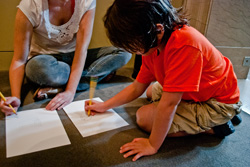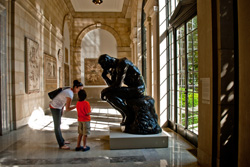Bridge Building Home and Community Based Program
 Beyond the school day, a Shafer Center Bridge Therapist can also support a child in his/her home or community through the Bridge Building Program. Many children with autism require systems to functionally navigate their environments. They often need a coach to provide pre-training about environmental expectations, a defined plan of what to do in those situations, and motivation for aligning with what is required of them. This therapist builds a bridge between the child and society. For some children this bridge is modeling for a child how to wait patiently in a restaurant instead of complaining and for other children that bridge is teaching a task list so a child can pack his/her own lunch for the next day.
Beyond the school day, a Shafer Center Bridge Therapist can also support a child in his/her home or community through the Bridge Building Program. Many children with autism require systems to functionally navigate their environments. They often need a coach to provide pre-training about environmental expectations, a defined plan of what to do in those situations, and motivation for aligning with what is required of them. This therapist builds a bridge between the child and society. For some children this bridge is modeling for a child how to wait patiently in a restaurant instead of complaining and for other children that bridge is teaching a task list so a child can pack his/her own lunch for the next day.
The Bridge Building Team
- Focuses on developing a child’s sense of self and skills needed in adulthood
- Uses principles of Applied Behavior Analysis (ABA) to promote independence
- Itemizes steps to make personalized plans for each environment
- Educates children on how to appropriately access systems within society
- Takes children to varying environments to role play expectations
- Promotes age-appropriate targets and interactions with peers
- Collects data across skill sets
- Uses The Shafer Center’s individualized programming (Connect XYZ and Bridge)
- Supports caregivers with trainings in varying environments
 Home based programming may involve self-management, leisure skills, health/exercise, cooking, chores, grooming, dressing, toileting, or bedtime routines. Whether your child is learning to play board games without worrying about winning every time, pick out his/her clothes for the next day, or setting his/her alarm clock, the therapist can offer cues to achieve these goals.
Home based programming may involve self-management, leisure skills, health/exercise, cooking, chores, grooming, dressing, toileting, or bedtime routines. Whether your child is learning to play board games without worrying about winning every time, pick out his/her clothes for the next day, or setting his/her alarm clock, the therapist can offer cues to achieve these goals.
Community based programming may involve self-identification, basic communication, first aid, safety, community knowledge, shopping, public eating, mobility/travel, or social awareness. Your child may be learning about pool safety, remembering how to pack his/her wallet, or making a shopping list and the therapist can remind him/her of the steps involved in each process.